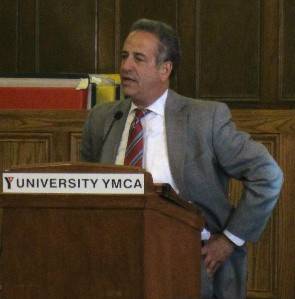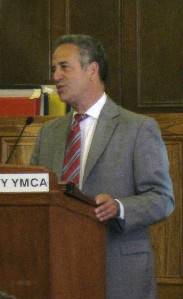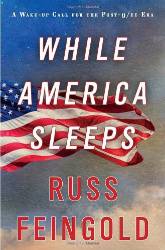Russ Feingold has been a hero of mine since October 2001, when he voted against the USA PATRIOT Act — the only senator to do so. That lone brave vote, cast at the beginning of one of the most fervently hostile political periods of my country’s history, surprised and moved me. At the time, I considered it political suicide. And yet he still did what was right, and he was the only one to do it. So I began paying attention.
I soon learned that Feingold had been voting his conscience his entire political career, and getting away with it. He broke party lines during President Clinton’s impeachment process, voting against dismissing the case because of his desire to hear all of the evidence. And having done so, he voted against convicting.
Feingold again acted contrary to his party’s wishes when he voted to confirm Attorney General John Ashcroft, stating that a president should have the right to choose his own cabinet.
Feingold opposed NAFTA and voted against the Defense of Marriage Act. And in the years following his vote against the PATRIOT Act, he continued to use his position in the senate to try to protect our civil liberties at home and our troops’ safety abroad:
- Wrote the Bipartisan Campaign Reform Act (with Senator John McCain)
- One of only twenty-three senators to vote against the Iraq War
- First senator to call for a timetable for troop withdrawal
- Introduced a resolution to censure President Bush due to allegations of illegal wiretapping
- Advocated for universal health care (particularly single-payer)
- Supports a woman’s right to choose
- Speaks out against capital punishment
- Supports marriage equality (and has for six years, before it was popular)
During the last midterm election season, Feingold’s town hall meetings were dominated by Tea Party members, who shouted down conversation so viciously that his supporters stopped attending. But unlike so many of our politicians (no matter their party), he wasn’t willing to flip-flop on his positions or compromise his integrity to win an election. On November 2, 2010, Russ Feingold lost his re-election bid to Tea Party-backed Ron Johnson, who’d spent over $8 million of his own money on his campaign.
Since then, Feingold has been busy with his grassroots political action committee Progressives United, which he founded as a response to Citizens United. He also wrote While America Sleeps, a book that outlines our “nation’s collective failure to respond properly to the challenges of the post-9/11 era” (17). In February 2012, Feingold was appointed co-chair for President Obama’s re-election campaign.
 Our problems with campaign finance and our epic fumbling in our foreign policies following 9/11 were the topics of the former senator’s talk at the University YMCA on Friday. During his speech, Feingold said that what inspired the topic of his book was a desire to “say something different that isn’t being said and that needs to be said.” He warned that even now, over a decade later, we’re continuing to “withdraw into ourselves in a way that is dangerous.”
Our problems with campaign finance and our epic fumbling in our foreign policies following 9/11 were the topics of the former senator’s talk at the University YMCA on Friday. During his speech, Feingold said that what inspired the topic of his book was a desire to “say something different that isn’t being said and that needs to be said.” He warned that even now, over a decade later, we’re continuing to “withdraw into ourselves in a way that is dangerous.”
Speaking about the Taliban, Feingold said that America has long been on the “wrong track with how to deal with this organization,” and he confided that he was haunted by the fact that before the 9/11 attacks, he “had a feeling that something was amiss,” and in early 2001 he’d even called for a study on the topic.
Once our government began to “exploit the events … for political advantage,” he said, our troops, our economy, our civil liberties, and our image in the rest of the world was compromised. And Feingold was quick to point out that “none of this has been fixed in the past eleven years, not under President Bush or under President Obama.”
When I learned that Senator Feingold was going to be visiting Champaign-Urbana, I threw caution to the wind and asked for an interview. I was surprised and delighted when he agreed to talk with me. I was allotted less than ten minutes, however, so I tried to make the best of it. It was difficult because Feingold is easy to talk with, and I wanted to dwell on each response he gave and follow up with my own opinions (a few of which would have challenged his position). Below is our all-too-brief conversation.
~~*~~
Smile Politely: As I’ve followed your career, I’ve often wondered why you’re never referred to as a “maverick” with the same reverence that McCain has always been?
Russ Feingold [laughing]: I don’t worry about those kind of labels, but the truth is that I’ve been called “maverick” hundreds of times.
SP: OK, this is news to me.
Feingold: In fact, when McCain started referring to himself as “The Maverick,” or Sarah Palin, a lot of articles were written in Wisconsin that my record was the most independent. If that’s a good thing, I guess I’m a maverick. It’s better than being called a lot of other things. I definitely played, on occasion, a maverick role, but I hope I did so in a constructive way. If I agreed with the majority of democrats I was proud to be part of the team; I didn’t want to be off the team. But when I had to, I had to as a matter of principle. I’ve been called a lot of stuff, and that’s certainly one I’ve been called, and that’s fine.
SP: So often, your stands on issues seem to be ten years ahead of their time. People are now coming around about the war, and the majority now agrees about the abuses of the PATRIOT Act. Many of those votes are now popular with the American people and other senators. Which do you think is the least controversial of your “maverick” votes today?
 Feingold: That’s interesting. I think that people realized right away that the PATRIOT Act was hurriedly put through. I would say that that vote is not as controversial as it used to be. I think that most people see the vote against the war in Iraq as perfectly reasonable. There are some votes I took, like when I voted for John Ashcroft for Attorney General — which you might say was a maverick vote — a lot of people now realize there was some validity to what I did, but that’s one that a lot of people still wonder, ‘Why did he do that?’
Feingold: That’s interesting. I think that people realized right away that the PATRIOT Act was hurriedly put through. I would say that that vote is not as controversial as it used to be. I think that most people see the vote against the war in Iraq as perfectly reasonable. There are some votes I took, like when I voted for John Ashcroft for Attorney General — which you might say was a maverick vote — a lot of people now realize there was some validity to what I did, but that’s one that a lot of people still wonder, ‘Why did he do that?’
SP: We now see President Obama struggling with his nominations, and you were saying at the time…
Feingold: That was the point. It wasn’t that I wanted Aschcroft to be Attorney General. It’s that Bush was president, and it’s a bad precedent to have an ideological litmus test for members of the Cabinet. The Court is a different standard, but members of the Cabinet … why can’t you have people around you who you want to be your advisors? Unless they’re unethical or unqualified, of course.
SP: Last February, you said that President Obama’s decision to accept super PAC money was wrong, and that by doing so he’d chosen to “dance with the devil.” Considering Progressives United, and considering that you’re one of the co-chairs in his re-election campaign, this put you in a real conflict, didn’t it?
Feingold: I was open about it. His campaign manager called me earlier in the evening and tipped me off, and said, ‘We’re going to have to do something, Russ, that you probably won’t like,’ and he told me what they were going to do and I said, ‘I don’t like it.’
SP: You didn’t have much of a choice but to publicly rebuke him.
Feingold: I told them that I was going to have to criticize it. They asked me if I still wanted to be co-chair of the president’s campaign. Absolutely. You know, I don’t believe in this idea that you can’t disagree with people on certain things, but think that what they do is good overall. I think the president probably really regrets the fact that he believes that he had to do this thing about unlimited money. I do think it’s dancing with the devil. I don’t think that he needed to do it. And I’m really hoping that he’ll win, which I believe he will, and I believe that he will be aggressive about trying to change the system. I hope to help him in some way.
But I’m comfortable with supporting people while not agreeing with them all the time. I think it’s weird that people think they have to agree with people all the time. It’s not the real world. So, I’m comfortable with it and I hope they are too. I’m proud to be a co-chair of his campaign.
SP: That touches on my next question. You’ve said that candidates who “have a good product to sell in terms of who they are and what they are” don’t need to take super PAC money. But don’t you think that this is why Obama might think he needs super PAC money? Because of his numerous decisions that some consider to be non-progressive?
Feingold: I think that they’ve convinced themselves of that. I’ve fought those old pros in Washington, the guys who believe in the big money, and some of them are his best supporters and his advisors in the White House. They believe in big money. And they believe in the power of big money. I believe more in the power of a strong message and identity. Romney’s going to have more money than Obama, and guess what? Romney’s going to lose. That’s because money isn’t the only thing. It’s who you are, and I think that everybody knows who Obama is.
But yes, you’re correct. They believe they need it.
SP: Do you think that’s because of his non-progressive policies though? I’m thinking of the drone attacks, the surge…
Feingold: No, I think it’s…
SP: …indefinite detention…
Feingold: No, I think it’s just that they believe that you can lose any election no matter who you are or how good you are if the other side has more money. I really think it’s just a generic fear of the power of money that drives people to do this. I don’t think he’s particularly vulnerable at all. It’s just that they fear the power of big money.
SP: Why do you think that Obama isn’t vulnerable? Why are you so sure that Romney is going to lose?
Feingold: Romney doesn’t appear credible in terms of the kind of person he is. He doesn’t appear to have principles. He doesn’t want to share a plan for how he’s going to make the economy better. He appears to be uninterested in, or very awkward on, foreign policy. And people don’t particularly like him. He has very little going for him. His on-paper identity that they wanted to trot out at the beginning made some sense — businessman who can fix the economy. But that’s not what’s come through. He seems awkward and not likely to be able to do that.
I think the president is in good shape because fundamentally voters like him and they think he’s earnest and hardworking and very bright, inspirational. So it’s really hard when one person is not particularly well liked and the other person is a well-liked incumbent. It’s unlikely Romney will be able to beat him.
But we’re not taking anything for granted. Being overconfident would be a big mistake, but I just fundamentally think in the end we’ll win if we’re careful.
 SP: In While America Sleeps, you said that America must “adjust to a new paradigm” for our “place in the world.” Can you elaborate on that, especially regarding what’s going on in Libya, Egypt, and Yemen this past week?
SP: In While America Sleeps, you said that America must “adjust to a new paradigm” for our “place in the world.” Can you elaborate on that, especially regarding what’s going on in Libya, Egypt, and Yemen this past week?
Feingold: This week, sadly, is a tremendous example of why I chose to write this book. I feel that we were awakened by 9/11, but through a series of mistakes and misdirection we have essentially gone to sleep on foreign policy. We only wake up briefly when there’s a catastrophe, such as this killing of our Ambassador. And then as soon as that’s over, we stop focusing on it, so we constantly get taken by surprise.
I’m trying to warn people, for example, about events that are occurring in Mali, where Al-Qaeda in the Islamic Maghreb has taken over the top half of the country. And they control Timbuktu now. They are directly connected with al-Qaeda. And they’re beheading people.
SP: And we’re not hearing anything about this. At least I’m not. Why?
Feingold: It was in The New York Times a few days ago.
SP [realizing I’m one of the sleepers]: OK.
Feingold: But, almost no one knows anything about it. And so I feel like we haven’t developed the capacity to know enough about places in the world, to have enough people in our country helping us get ahead of things. We’re always catching up, and so people are shocked by these kinds of events. But the truth is, if we were aware of what’s really happening on the ground in these countries, we’d be less surprised and more able to prepare for it.
So that’s my concern. It has nothing to do with a political party. It has to do with whether this country can make the historic shift in the twenty-first century to the reality that we now live in. It’s different than the nineteenth century; it’s different than the twentieth century. Every century is different. We cannot act like we’re back in the twentieth century.








